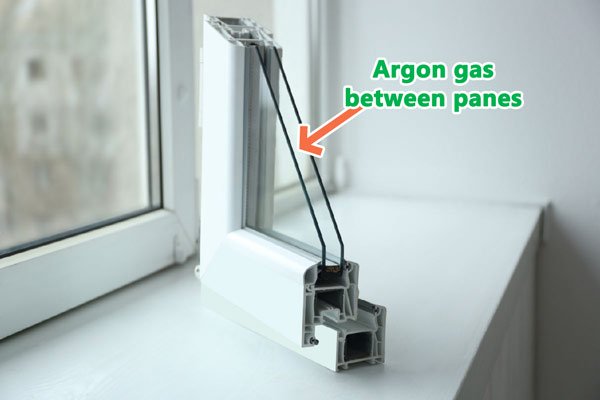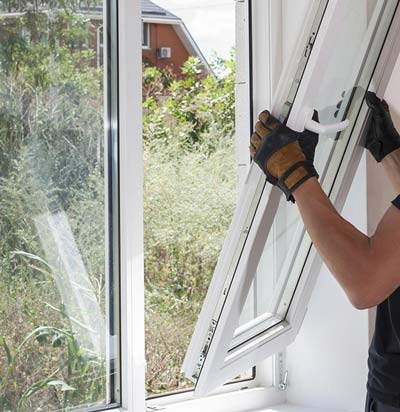There is a lot more to windows than frames and glass. You may already know that (noble) gases are used to fill glass panes. However, you may not be familiar with argon gas.
You have lots of choices when it comes to windows including colour, material and design.
This article will focus on the options you have for the gas that fills your window, specifically argon gas.
- What is argon gas?
- What are the advantages and disadvantages of argon gas glazing?
- What are the differences between argon and krypton gas?
- Replacing the glass or the whole window with argon gas glazing?
- When to replace your glass?
- What is the lifespan of a double glazing unit?
- What are the benefits of replacing the glazing?
- When to replace your whole window?
- Get quotes from glazing installers
What is argon gas?
Argon gas is used to increase the energy efficiency of thermal windows. The gas is used instead of air to fill the spaces between the layers of glass in double or triple-pane thermal windows.
Thermal windows have two or three layers of glass with a space in between each layer. When paired with low-E glass, argon gas will help to bring the temperature of the window to room temperature which reduces the intensity of drafts that occur around the windows.

What are the advantages and disadvantages of argon gas glazing?
Before you choose, it is important to know the benefits and drawbacks of choosing this type of glazing. The benefits of argon gas glazing are:
- Insulates more effectively than air
- It is inexpensive
- Non-toxic
- Colourless and odourless
- It is a naturally occurring gas
- It improves thermal performance
- Increases soundproofing
- Reduces the possibility of condensation and frost
- Does not corrode window materials
- Argon gas contains no moisture, so it will not make the window cloudy over time
There are also some disadvantages to argon gas including:
- When the glass expands and contracts, the argon gas can leak out from the seal
- If there are gaps, there will be condensation
- It can leak over time
What are the differences between argon and krypton gas?
Another gas that manufacturers use to fill windows is krypton. Both argon and krypton gases are heavier than air, odourless, and non-toxic. As they are denser than air, they slow down the energy that travels through them keeping them efficiently insulated. But what are the differences?
- Krypton is twelve times denser than air and argon is six times denser.
- Argon is much cheaper than Krypton
- Argon is easier to produce
- Krypton is more energy-efficient, but argon provides better value and cost-effectiveness overall.
Replacing the glass or the whole window with argon gas glazing?
You may be considering replacing the glass in your windows rather than replacing the entire window including the frame. Both options can increase energy efficiency and improve the overall look of your home.
While replacing the glass will be cheaper, it may be the frames that are the primary issue.
Replacing the glass
- Less expensive
- Shorter installation time
- You will miss out on new efficient frame materials
- You will improve the energy efficiency of your windows
- Keeps the original frames if you live in a period or traditional home
Replacing the whole window
- Long-term solution;
- Investing in the overall value of your home;
- More expensive;
- Advisable if your windows are old or damaged;
- You will get lots of customisable options to get the aesthetic you want.

When to replace your glass?
Replacing your glass is considered to be a short term solution to any window problem. In most cases, you will find you have to replace the whole window eventually.
You should check with the manufacturer to find out if there is a warranty on your glass first. You should consider replacing your glass if:
- Your frames are fairly new;
- An expert has told you the frames are not the issue;
- The glass is broken or compromised;
- You own a period or historic building.
What is the lifespan of a double glazing unit?
Subject to proper maintenance, good-quality double glazing could last up to 40 years.
If you find the temperature in your home is different than when you first installed them, the seal between the two panes of glass may be broken and you should consider installing replacements.
What are the benefits of replacing the glazing?
If you opt to only replace the glazing, it will be the cheaper and less time-consuming option. You will also maintain the style of your home by keeping the original frames.
The thermal barrier in the new glass windows will make your home more energy-efficient and regulate the temperature of your home more effectively.
When to replace your whole window?
Replacing the whole window is more complex and expensive. It is a big decision that should be carefully considered but it may be the best option long-term.
- Design your windows from scratch to create a bespoke design that fits your style and budget;
- Change your windows to give you flexible opening options;
- Increase the security of your home;
- Reduce your energy bills by investing in modern materials such as uPVC which has excellent efficiency.
Get quotes from glazing installers
You will need to seek advice from a glazing expert before you go ahead with installing or replacing your glazing. They will be able to give advice on which windows will work best for your home and answer any questions you may have.
Request your double glazing quotes now.